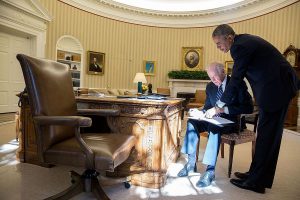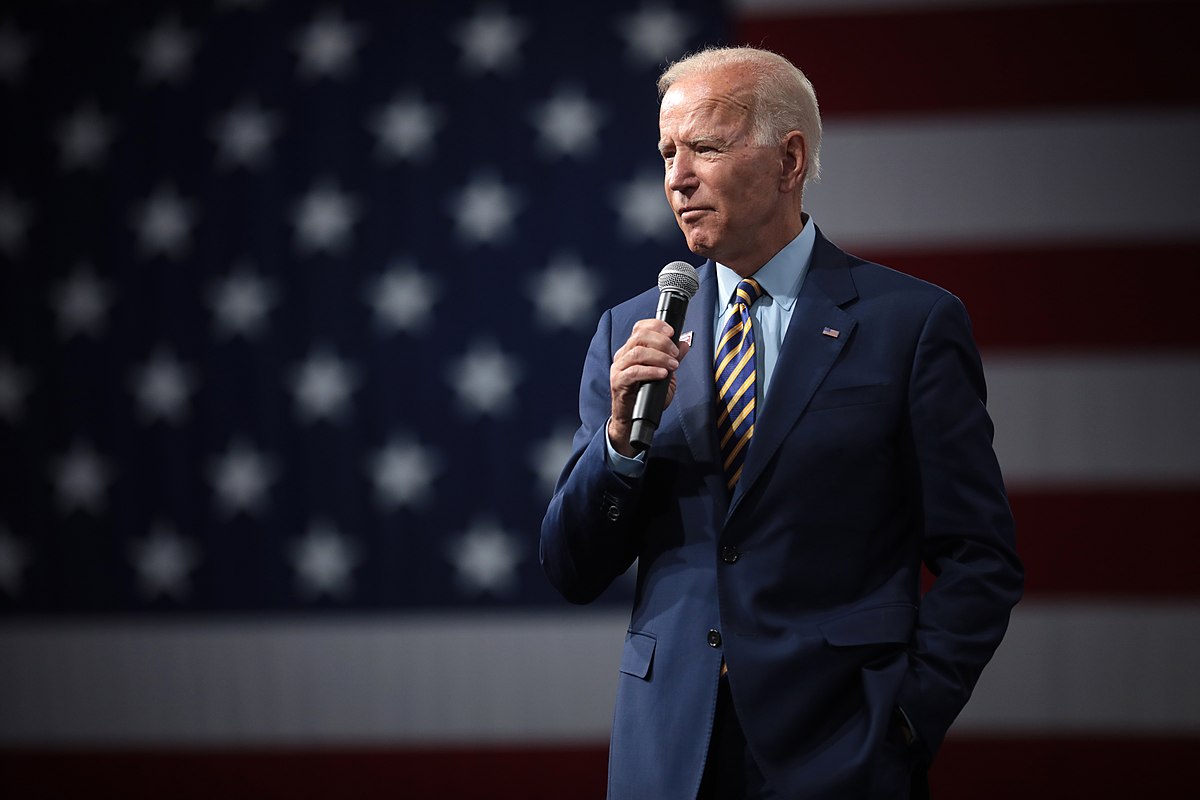[vc_row][vc_column][vc_column_text]

Biden and Obama/The White House/WikiCommons
On top of being the only US president impeached twice, Donald Trump leaves a legacy of attacks on the very foundations of free speech and specifically on journalists and the media.
President-elect Joe Biden has offered people hope of returning to normal politics, rather than another term of a president with a severe distaste for free speech. But are notions of a saviour cometh and confirmed on Inauguration Day on 20 January misguided?
Biden has an extensive record in politics from which he can be judged, as well as eight years in high office as vice president under Barack Obama that could give an indication of how he plans to proceed. But the picture that emerges is not one that identifies Biden clearly as a champion of free spech or otherwise.
Going back to the start of Biden’s career as a senator, the signals were already mixed on issues of free speech. In 1989, Index reported on then Senate Judiciary Committee chair Biden introducing a bill to make it illegal to desecrate a flag. Nan Levinson reported at the time: “Biden’s bill and a similar one introduced in the House are intended to sidestep free speech issues by outlawing actions without mentioning motivation, the part of flag desecration that the Court determined is protected by the First Amendment.” But in his favour, some 13 years later Biden helped propose the creation of a “Radio Free Afghanistan”.
In more recent years, there is the way in which the Obama Administration handled whistleblowers. Biden can set an early example with the case of Julian Assange by pardoning him. The question is, will he?
Such an action may have been considered by the Obama administration, but was not pursued. The whistleblower involved in the case, Chelsea Manning, eventually had her sentence commuted by Obama in January 2017.
Assange faces charges under the US Espionage Act, a first for a journalist or publisher. The onus is therefore on Biden to ensure there is no legal precedent stopping a journalist from publishing sensitive information again. Pardoning the WikiLeaks founder would go some way to achieving this.
Rumours of an immediate pardon once Biden takes office have arisen and many believe the election of Biden to be a positive thing for Assange. His lawyer Edward Fitzgerald went as far as telling Associated Press “Much of what we say about the fate which awaits Mr. Assange remains good because it’s about systemic faults in the prisons and his underlying conditions,” he said.
But as yet there has not been any indication either Trump or the president-elect will move to do this and any speculation has shaky foundations. There is a contradiction in that – though Obama may have commuted Manning’s sentence – in 2010, Biden described Assange’s work with former US intelligence analyst Chelsea Manning as “closer to a high-tech terrorist than to the [actions of revealing the] Pentagon Papers.”
“The Obama administration went after other whistleblowers whose cases remain active. Edward Snowden for example. These track records and trends started before President Trump,” said Rebecca Vincent from RSF in an earlier interview with Index.
In fact, eight of the 13 people charged under the Espionage Act since its inception in 1917 were during the eight years of the Obama presidency.
Jeffrey Sterling was convicted and sentenced to three and a half years in prison in 2015 for violations of the Espionage Act. Through correspondence with US journalist James Risen, Sterling brought to light covert plans to frame Iran by providing a flawed design for a component of a nuclear weapon, also known as Operation Merlin.
In an interview with Index, Sterling spoke of the importance of whistleblowers and said: “A vital part of free speech is the ability of citizens to hold those in power accountable by speaking out about wrongdoing and misuse of power.
“Whistleblowers are essential to free speech because their courage exposes what the unfettered power of government would prefer not to be known.
“Without whistleblowers, the wrongdoing and abuses of government will remain hidden to the detriment of the people. Without whistleblowers, free speech can be rendered ineffectual and of no concern to those in power.”
In short, misuse of the Espionage Act stops those working for US intelligence agencies and government offices from speaking out against wrongdoing.
“Targeting whistleblowers with the severe penalties and implications of being prosecuted under the Espionage Act has a chilling effect on anyone who might choose to exercise their free speech by being critical of or exposing the wrongful acts and abuses of government,” Sterling noted. “In my opinion, the Obama presidency did all it could to characterise whistleblowers as anti-patriotic and criminals and offered absolutely no protection.”
“When those who are the subject of a whistleblower’s complaint control the dialogue, there are no whistleblowers, just leakers. The Obama administration set the tone by essentially eliminating the very idea of a whistleblower and instead characterised them as leakers, or criminals.”
The contrast between Obama and Trump’s outward attitudes towards the press, however, is significant. While Trump chose to claim most of the criticism against him as “fake news”, Obama often spoke of the importance of journalism, a free media and free speech, such as after the 2015 attacks on Charlie Hebdo in Paris.
At the same time though the 44th president came under repeated fire for his actions towards media freedom and freedom of information in particular. Access to public information during his presidency was limited. The USA’s Freedom of Information Act allows US citizens, like many across the world, to question local and federal authorities. The Obama administration apparently spent a record $36.2 million in legal costs in the final year alone to preserve its right to turn over redacted information.
A lack of transparency and targeting of those revealing information in the public interest does not cast a positive light on Obama’s then right-hand man.
It is perhaps unfair to negatively predict the future of the Biden presidency and its role of free speech solely on the president he served under as second in command. The role of vice president offers no true indication of support of a particular policy; many doubt the power the role has. John Adams once described the role as “the most insignificant Office that ever the invention of man contrived or his imagination conceived”. It could reasonably be said that whether or not Biden was supportive of Obama’s free speech policy, there would have been little he could have done about it either way.
Yet it is no secret that Obama is a man Biden greatly admires and – while the former Delaware senator did not exercise as much power as some vice presidents – the relationship between the two was famously good. Perhaps a certain level of emulation can be expected.
The Committee to Protect Journalists has put forward a white paper to set out how Biden can go about restoring freedom of speech in the USA. Among their suggestions were calls to “set an example for the world” by ensuring the independence of US government-funded media, appointing a special presidential envoy for press freedom and ensuring previous administrations’ attacks on publishers and whistleblowers were not repeated.
“President Biden should commit to an open and transparent administration that supports Freedom of Information requests, back Justice Department guidelines that protect confidential sources, and pledges never to use the Espionage Act to prosecute journalists or whistleblowers,” they said. “These long-standing concerns of CPJ and the press freedom community were also raised during the Obama administration. “
They said: “President Biden has the opportunity to restore American influence in a critical area.”
“However, this can only be achieved if defence of press freedom is a matter of principle, and not expediency. America must confront its adversaries, but also challenge its friends.”
Adopting such policies would go a long way to allay fears of a Biden presidency that departs from recent ones.[/vc_column_text][/vc_column][/vc_row][vc_row][vc_column][three_column_post title=”You may also like to read” category_id=”579″][/vc_column][/vc_row]





